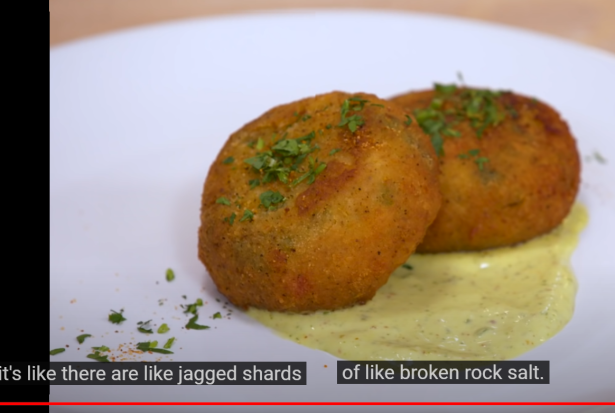QT 110 – Sense and Sensibility

Why hello there, and welcome back to Kitchen Catastrophe, where today…I’m going to be frank, I’m spinning, here. Not spiraling, which I’ve done more than a couple times on the site, but spinning: I came up with this idea for the post like, 30 minutes ago, and it needs to be uploaded in less than 12 hours, so if we run a little thin on the theme, my apologies. One of the initially unconsidered complications of the crunch of this month: it’s a lot easier to come up with ideas for writing when you have time to sit down and read, instead of pinging between work, shows, and social time. (editor’s note: Jon would then go one to have just a real mess of a Thursday, Friday, and Saturday, leaving him to give up on Sunday, and postpone this until now. We’ll see if he gets better as his schedule calms down over the next few weeks.)
So what’s this theme? I’m glad you asked, rhetorical audience member. Wouldn’t want us all…going in blind, would we?
Sight Unseen
As I hope comes as no surprise to you, I feel like I want to touch on the fact that I am a huge comic book nerd. As such, I assure you, I know a fair bit about Daredevil.
Fights The Hand Ninjas, trained by his mentor Stick, hangs out with private investigator Jessica Jones, you know the guy.
Daredevil, the Blind super-hero whose other senses have heightened to make him an amazing crime fighter, a line that people mention, but seem to forget there was a crucial element of “radioactive waste” that helped that transition. And the thing is…I don’t know how much people remember how silly that idea is. Like, “Silly enough that a parody of it became one of the biggest cartoon sensations of the 80’s and 90’s.”
Fight the Foot Clan, trained by their mentor Splinter, hang out with investigative reporter April O’Neil, you know the guys.
However, it turns out the idea isn’t entirely wrong: multiple studies of blind persons have found that their brains use some of the space normally used for processing visual stimuli for other functions. They literally rewire their own brains to be better. However, in the short term, being blinded will not make you ‘better’ at other tasks. What it will do is make you MORE AWARE of them. And that’s interesting, because I’ve recently heard a fair bit about two separate approaches to this idea.
The first is the “Reverse Engineering” show on Bon Appetit. A basic overview of the show is “Chris Morocco, the ‘super-taster’ of the Bon Appetit Test Kitchen, is blindfolded, given a dish, and asked to recreate it.” I’ve mentioned it before, but it is a fairly enjoyable show, though if you watch enough of it, you’ll probably find you have some previously uninspected ideas on ‘fairness’. (Like, any time an ingredient list climbs over 10 ingredients for a component, I definitely get a little “okay, we should be building in some leniency here.” Like, there’s a couple times where he clearly gets to the same IDEA in a different path.)
And what made this idea kind of click for me is actually a line in yesterday’s episode.
Note the seamless editing of two different frames of the same plate so you can all read the subtitle in its entirety.
That’s Chris describing how the Tony Chachere’s Creole Seasoning felt with his mask on. That’s the “increased awareness”. And I’m going to tell you right now: that seasoning is NOT very rough. Like, it’s not quite as fine as say, Johnny’s Seasoning Salt, but it’s pretty close. So the idea of the seasoning feeling like jagged shards of rock salt speaks to just HOW aware he had become of the texture of the salt.
The other thing about lack of sight and food that pinged in my head was a now-completed pop-up venture that started a couple months ago in Seattle: “Dining in the Dark”, a pre-fize (meaning “decided beforehand”) menu dinner for which you would be blindfolded: after being brought to your table, they blindfold you, and serve you three courses that are described VERY vaguely on the menu beforehand. So a meal directly seeking to give you the space to experiment with taste and smell in a new way. (An idea that did frustrate a chef friend of mine, especially given the high price-tag of the menu. For the $90 they were asking, I could get a SIX course pre-fixe menu here in Leavenworth, or get three normal entrees in Port Orchard.
You could buy most of this chair!
Don’t ask why I was taking pictures of chairs!
And I don’t disagree that the price could probably be like, $60 and still do well, and if we want to unpack the classism of fine dining, and push for cheaper urban real estate and business, I am ALL for it. I’m a cooking blog, guys. I am down to eat the rich, as long as I get to right about it…just not right now, because I’m already trying to get this done. Let’s plan a growing-more-cannibalistic-by-the-minute revolution later. FOR THE MOMENT, I want to discuss this idea of how involving our various senses changes food.
Sight, for instance, plays a paradoxical role in food: there’s an entire award-winning Netflix show named after the concept that “there is plenty of ugly, delicious food”, and that it is a detriment to restaurants that they cannot serve delicious but unappealing looking dishes. On the other hand, the old rule is that “you eat first with the eyes”, and trust me, when you watch a trained chef struggle to grasp basic elements about a dish because he can’t see it, that’s some pretty solid evidence that your eyes are playing a solid role.
But I would say that sight has its limits, and that’s the space that Dining in the Dark is seeking to explore: Just think about how you close your eyes as you smell deeply of a dish, or after a delicious bite. Sight is useful for setting expectations, but once you get into the experience, you kind of abandon it.
Not how I would have framed it, but you do you, Dr Grant.
Art Thou Feeling it Now, Mr Krabs?
Interestingly, I think an underrated sense for food consumption is that of touch. “melt in your mouth” is a measure of texture, for instance. As is “fall off the bone”. And show me someone who doesn’t eat their ribs by holding them, and I will politely avoid them, or impolitely demand they fucking explain themselves. There are NUMEROUS sexual fetishes I would find less off-putting to learn a person has, over “I eat ribs with a knife and fork.”
I mean, with Whedon and Tarantino, having a foot fetish is like, the new “problematic artist” trope.
There are textures I (and others) can’t STAND to eat, to the degree that I had 2 sausages with gristly chunks 2 years ago, and have only eaten at ONE sausage place in Leavenworth since, because their sausages come pre-cut. There are EIGHT sausage places within ¼ mile on the street I work on, and I have ignored 87.5% of them for almost 2 years.
I feel like I’m losing the thread here, so let’s see if we can patch this together with the other big one before I pass out.
Can You Smell What the Blog is Bookin’?
BARELY underrated, in my opinion, is the potency of smell on taste. I say barely because most people do definitely understand that smell is important, but sometimes, they seem to not get exactly HOW important. Like, there’s an ongoing argument on whether or not Skittles actually have different flavors: a study of blinded and nose-blocked tasters were given a flavor of skittle,” told” what it was, and asked if that was true or not. (So like “This is a grape Skittle”. (They eat it) “Was it actually a grape Skittle?”) They had a 50-50 success rate on calling it out, which the researcher notes, since the options were “yes” and “no”, is a perfectly random return rate. Skittles says the study is wrong (or at least, producing flawed conclusions), asserting that they do directly put flavoring in both the hard outer shell, and the candy inside. Which…I mean, of course they’d say that, on the one hand: when asked “have you been lying to millions of people about fond childhood memories”, you answer “no”. That’s Don’t Get Murdered by Angry Mobs 101, and Don’t Be The CEO That Tanks Our Sales 116.
“You’ll pay for causing a downturn in Q2 returns, damn you!”
Huh. Not often the mob is ALSO the Board. Except in the olive oil business.
On the other hand…I mean, if you’re putting strawberry essential oils in a candy, how much of that are we processing as ‘scent’, and how much as ‘flavor’? Have you ever licked vanilla extract? It TASTES heinous. But it SMELLS amazing.
And while we could talk about how this kind of sets up how we prefer certain foods when we’re sick (since our noses are clogged, reducing our ability to smell, and changing what flavors are easier to taste, and further we tend to go for soft textured foods like soups or porridge because a lot of the enjoyable flavors of more crunchy foods are heavily aroma-dependent, and often during illness we become sensitive to noise, meaning crunchier foods are less enjoyable.) I wanted to talk about a more severe version of that, so we can close this post on a bummer. We opened with comics, and close with sorrow. The Classic Jon Date-Night Special.
Specifically I want to talk about the havoc that COVID-induced Anosmia and parosmia are inflicting. Anosmia is the medical term for “loss of smell”, while parosmia is something much more confusing: it’s when the brain is smelling things…incorrectly. It turns out that the way COVID causes you to lose your sense of smell causes minor brain damage in your smell-processing center, and while your body is recovering, it can fix that region the wrong way. A good (if somewhat older) illustration is the example of an old telephone switch-board.
No, this is not a picture of computer-corn-dog acupuncture. It’s how phones used to work.
COVID runs up and pulls all the cords out, disconnecting calls. Your body tries to plug them back in, but doesn’t put all of them back in the right spots, leading to confused new connections. For one woman, coffee, peanut butter, and literal shit all smelled like burning rubber. For another, broccoli started smelling like chemicals. One family almost didn’t realize their house was on fire, because none of them could smell the smoke.
Chefs who have contracted the illness talk about how it’s totally messing with their very sense of identity: if you define yourself as someone who makes delicious food, and now you can’t tell if your food is good or not anymore…who are you? How do you properly season dishes when all you taste is burning rubber?
These conditions are getting a lot more attention now, and fortunately, most people who experience the loss of smell or taste have shown that it comes back over time: they might have to get kits of essential oils and train their brain to remember “this is lavender. This is lemon”, but so far, most of the cases have been shown to be temporary. We can only hope they all turn out to be so.
NEXT WEEK: I THINK WE MAY HAVE TO CONDENSE TO ONE POST, AS I WILL BE AFK AND AFK (AWAY FROM KEYBOARD AND AWAY FROM KITCHEN) FROM THURSDAY MORNING TO SUNDAY EVENING. SO WE MIGHT JUST TALK CHARCUTERIE, OR AGUA FRESCAS, OR SOMETHING. WE WON’T KNOW UNTIL SUNDAY/MONDAY.













